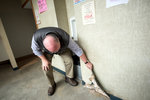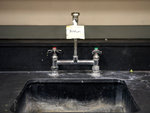



The Toledo School District has a $12.9 million bond on the Nov. 7 general election ballot that if approved would completely renovate the high school and make improvements to the elementary and middle schools, as well as replace the running track and construct new restrooms at the grandstands.
The estimated tax rate is $1.94 per $1,000 in assessed property value.
The bond covers many of the same projects as the $14.2 million bond measure that failed in February.
“The only real changes are we’ve been able to take care of some of the projects since last February,” Superintendent Chris Rust said.
Those projects completed through the maintenance and operations levy currently on the books include upgrades to the kitchen, the installation of new LED lights on the exterior of the high school and the replacement of a broken drinking fountain with a water bottle filling station that meets ADA requirements, among others.
The completed projects have brought the bond amount down below the $13 million mark.
Earlier this year, the TransAlta Weatherization Board approved a $231,400 grant to replace failing and inefficient boilers at Toledo Elementary School next summer. The grant came through after the school board had already approved a resolution to place the bond on the November ballot. Even with the project now paid for through other means, the money will be needed for rising construction costs, Rust said.
“We didn’t know about the grant, so when the grant came through that gave us the possibility of reducing it to say $12.6 million, but construction costs are going up by about 4 percent every year,” Rust said. “That is going to happen for both years between when we pass the bond and when we take occupancy, so we’re looking at well over $1 million of increased costs.”
Those costs will need to be absorbed into the $12.9 million bond, he said. The district plans to find ways to reduce costs during the design phase of the project.
“We have all these moving parts going on and my job is to make it all come in for less than $12.9 million,” Rust said.
The largest issue facing the high school, which would undergo a complete renovation, is that it does not currently meet seismic standards. The building has demountable walls that don’t insulate sound or carry electricity, which would be replaced with permanent walls. There is also no air conditioning in the building.`
Rust said the district earlier upgraded its heating system, but at the time there was no money for the cooling aspect.
In October of last year, a thermometer at the front desk of the high school hit 84 degrees at 10 a.m. with all the school’s doors open, Rust said. He also said that during a facility advisory committee meeting last year, he had to end the meeting early because he began to have symptoms of heat exhaustion.
“They opted to do heating and leave room for the cooling,” he said. “This is the later they had in mind.”
Projects at the elementary school include new sidewalks in the building courtyards, a seismic upgrade and the replacement of exterior windows.
At the middle school, the student restrooms would be upgraded, the locker rooms would be renovated and the plumbing systems and fixtures would be replaced.
There is an estimated $207,000 worth of projects at the elementary school, and over $1 million at the middle school, while the high school would make up the rest of the bond with over $10.69 million of improvements.
Rust said some in the district have claimed that the approval of the bond would somehow benefit the superintendent personally, something he said would not take place.
“That’s not even possible. Even if it was ethical, it’s not possible because bond money never touches our fund,” he said.
The last time a bond was approved in Toledo was in 1994. The $5.8 million measure was approved with 70.1 percent. The money was used to remodel the grade school and construct a new gym and three classrooms in the building.
Another bond measure in 2014 for $23.5 million failed with over 62 percent of the voters opposed to it.
“The thing that worries me the most is that it isn’t going to get any cheaper than this,” Rust said of the current measure on the ballot. “With upwards pressure on construction costs, I don’t know that I’m going to be able to continue to chip away at projects with grant money and that sort of thing and certainly not enough to keep pace with the four to five percent growth in construction costs.”
The measure would come with an estimated $8 million in state match.